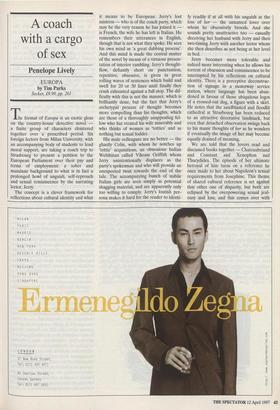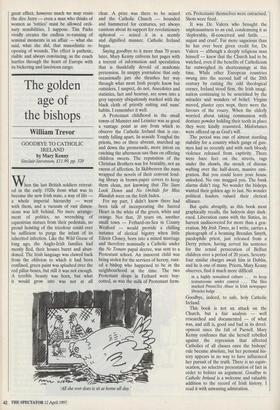A coach with a cargo of sex
Penelope Lively
EUROPA by Tim Parks Seeker, £9.99, pp. 261 he format of Europa is an exotic gloss on the country-house detective novel — a finite group of characters cloistered together over a prescribed period. Six foreign lectors from Milan University, with an accompanying body of students to lend moral support, are taking a coach trip to Strasbourg to present a petition to the European Parliament over their pay and terms of employment: a sober and mundane background to what is in fact a prolonged howl of anguish, self-reproach and sexual reminiscence by the narrating lector, Jerry.
The concept is a clever framework for reflections about cultural identity and what it means to be European. Jerry's lost mistress — who is of the coach party, which may be the very reason he has joined it — is French, the wife he has left is Italian. He remembers their utterances in English, though that is not what they spoke. He sees his own mind as 'a great dubbing process'. And this mind is made the central matter of the novel by means of a virtuoso presen- tation of interior rambling. Jerry's thought- flow, defiantly short on punctuation, repetitive, obsessive, is given in great rolling waves of sentences which build and swell for 20 or 30 lines until finally they crash exhausted against a full stop. The dif- ficulty with this is not the manner, which is brilliantly done, but the fact that Jerry's archetypal process of thought becomes more compelling than his thoughts, which are those of a thoroughly unappealing fel- low who has treated his wife miserably and who thinks of women as lotties' and as nothing but sexual fodder.
His male colleagues are no better — the ghastly Colin, with whom he notches up lottie' acquisitions, an obnoxious Indian Welshman called Vikram Griffith whom Jerry unintentionally displaces as the party's spokesman and who will provide an unexpected twist towards the end of the tale. The accompanying bunch of nubile Italian girls are seen simply as potential shagging material, and are apparently only too willing to comply. Jerry's loutish per- sona makes it hard for the reader to identi- fy readily if at all with his anguish at the loss of her — the unnamed lover over whom he obsessively broods. And she sounds pretty unattractive too — casually deceiving her husband with Jerry and then two-timing Jerry with another lector whom she then describes as not being at her level in bed.
Jerry becomes more tolerable and indeed more interesting when he allows his torrent of obsession and reminiscence to be interrupted by his reflections on cultural identity. There is a perceptive deconstruc- tion of signage in a motorway service station, where language has been aban- doned in favour of those ubiquitous logos of a crossed-out dog, a figure with a skirt. He notes that the sandblasted and floodlit cathedral at Strasbourg has been reduced to an attractive decorative landmark, but even that detached observation swings back to his manic thoughts of her as he wonders if eventually the image of her may become equally drained of meaning.
We are told that the lovers read and discussed books together — Chateaubriand and Constant and Xenophon and Thucydides. The episode of her ultimate betrayal of him turns on a reference he once made to her about Napoleon's sexual requirements from Josephine. This theme of shared cultural reference is set against that other one of disparity, but both are eclipsed by the overpowering sexual jeal- ousy and loss; and this comes over with great effect, however much we may resist the dire Jerry — even a man who thinks of women as `totties' must be allowed ordi- nary sensibilities, I suppose. Tim Parks vividly creates the endless re-running of seminal moments in an affair — what she said, what she did, that masochistic re- opening of wounds. The effect is pathetic, risible and always convincing, as the coach hurtles through the heart of Europe with its bickering and lascivious cargo.



































































 Previous page
Previous page